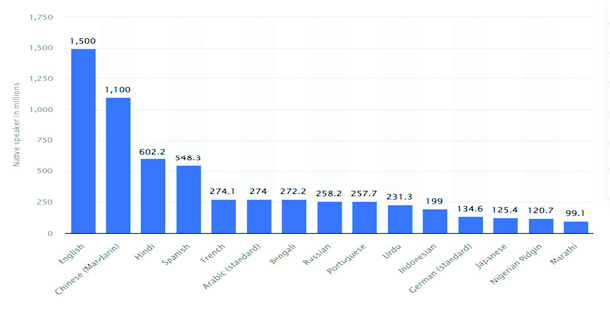Abstract
The English language is the most common universal language spoken globally. Therefore, the importance of practicing the English language in daily life, despite an individual’s nation or mother tongue is imperative. This research paper aims to highlight the importance of English language learning within contemporary life. A review of published literature sources is used within this study. The following factors are included within the study: English within education, communication, and economic progression. This study has revealed that the English language is imperative to progress within higher educational institutions as it is the most common medium of instruction given to students globally. International communication to ensure societal progression and sustainable development is achieved through the medium of English language. However, colloquialism can sometimes cause confusion including language used by Gen Z. In addition, economic progression is achieved through unified communication with national and international governing bodies, who’s common language is English. It is possible for every individual to learn the English language, particularly when there is access to technological platforms in contemporary life. However, challenges are faced by individuals if appropriate hardware and software to English language acquisition is not available, in addition to a lack of or unstable internet connectivity. Recommendations are made to help English learning acquisition in contemporary life.
1. Introduction
The English language is the most common universal language spoken globally. It is the largest global language including native and non-native speakers (Eberhard, Simons, & Fennig, 2021). According to Somani 2021 there are “approximately 7,139 international spoken languages, there is a continuous fluctuation in this number, as new discoveries on languages and dialects are being made daily. 40% of languages are deemed to be endangered while 23 languages are spoken by half of the global population.” (Somani, Motivating students to practice the English lan-guage, 2021). Therefore, the importance of practicing the English language in daily life, despite an individual’s nation or mother tongue is imperative. The English language is deemed as the “language of the world” (Salsabilla, 2021). According to a global survey, in 2022 approxi-mately 1.5 billion people worldwide spoke the English language, combining native language and English as a second language. This figure was higher than Mandarin Chinese speakers which reached 1.1 billion people in 2022. Figure 1 illustrates the number of the most spoken worldwide languages in 2022 in millions (Statista, 2022).
Therefore, it is evident that the English language is very important and has an impact upon many aspects of societal d evelopment.

Objectives
This research paper aims to highlight the importance of English language learning within contemporary life. A review of published literature sources is used within this study.
2. Results and Discussion
The following factors are included within the study: English within education, communication, and economic progression.
2.1 English within education
This study has revealed that the English language is imperative to progress within higher educational institutions as it is the most common medium of instruction given to students globally. Within India for many students, it is a second language after their mother tongue and a medium through which higher education occurs in numerous institutions (Somani, Motivating students to practice the English language, 2021). Although individuals may be familiar with the English language, fluency is important because poor English language skills can reduce the effectiveness of communication, consequently resulting in misinterpretations and the generation of barriers leading to frustration (Kapur, 2018). Similarly, if educators are unable to communicate with their students effectively in the English language, or students interpret educator instructions students resorted to online learning platforms where live lectures in the English language took place, examinations and assignment submissions occurred. It is imperative for students to understand the English language so that they can achieve their desired qualifications and create a better quality of life and sustainable future for themselves (Somani, Post Covid-19 Effects on the Future of Students in Higher Education, 2021). Numerous top-ranking universities speak the English language due to the fact English is the dominant language of the sciences and international research studies (Naved, 2022). This is to ensure research is available to all students who would like to acquire knowledge and build upon previous research findings.
2.2 Communication
Learning the English language is a medium through which individuals can communicate effectively with people globally. It reduces challenges when travelling and enables learning about different cultures more enjoyable due to ease of communication. In addition, English is deemed as the “language of science, mathematics, technology, tourism and countless other areas” (Gallery, 2022). The English language is a common medium through which countless professionals can communicate to present challenges and find solutions to problems. International communication is vital to ensure societal progression and sustainable development is achieved through the medium of English language. Communication has become easier due to the international use of the English language. It has facilitated global businesses, healthcare and medicinal supplies, technological advancements, international trade etc. All these elements are vital for economic progression within a nation. Without communication through a common language international collaboration between industries would be extremely challenging.
The English language dialect and accents can vary between regions within the United Kingdom. Therefore, the standardised English language used to communicate is following the ‘Queen’ or ‘King’s’ English. With the progression of time and emergence of Generation Z also known as Gen Z, who are “the generation of people born in the late 1990s and early 2000s.” (Merriam-Webster, 2022) colloquialism can sometimes cause confusion providing words with different meanings. There-fore, it is important for educational institutions to ensure English language is being taught properly, providing students with reading material and other sources through which they can learn the English language. The influence of social media and digital entertainment have impacted upon the lan-guage acquisition of Gen Z individuals. For example, YouTube, TikTok, stream-ing services like Netflix, Amazon Prime and Disney to name a few (Pinilih, 2020). It is important for students to be subjected to the formal English language as unified communication is vital for personal and societal development.
2.3 Economic progression
Economic progression is achieved through unified communication with national and international governing bodies, who’s common language is English. The English language has provided a foundation for international trade agreements and communication to occur for economic progression within nations. Formal communication including telephone calls, emails, formal presentations, online ‘chat’ all require unmistakable information transfer to ensure utmost clarity. This will ensure economic decisions can be made without hesitation due to poor communication. In addition, the proper use of the English language entails sentences that are formed through the utilisation of correct grammar and sentences. The use of English language in terms of economic progression is vital for good interpersonal skills that is required for negotiation and convincing other individuals. Research has indicated that there is a direct correlation between “the English skills of a population and the economic performance of the country” (WEF, 2017). There is an increase in indicators like GDP and Gross national income. Out of sixty countries within the English Proficiency Index there was a growth in capita income when the individuals within the countries and territories had better English skills. In addition, Human Resources managers and recruiters reported that individuals with excellent English language skills earned between thirty to fifty percent higher salaries than other individuals within the same country (WEF, 2017). There is a link between English proficiency and the gross national income per capita. When individuals possess good English language skills, there are s ubjected to increased salaries, this then gives rise to individuals and governments are motivated to invest within English language training. However, on a personal level, the English language skills that individuals have acquired by individuals has facilitated individuals to apply for employment opportunities which will provide an improved quality of life.
3. Conclusion
This research paper has highlighted the importance of learning the English language in contemporary life. It is important within educational institutions as English is global medium through which knowledge acquisition occurs. The English language is vital element of communication within personal and professional context as it provides a common language to find solutions to forthcoing challenges. In addition, economic progression is dependent upon international understanding and ease of communication in one common language. Agreements can be made, and it eliminates any miscommunication between individuals. The English language also can break down barriers and establish new relationships with global nations due to effective communication strategies and true understanding.
It is possible for every individual to learn the English language, particularly when there is access to technological platforms in contemporary life. However, challenges are faced by individuals if appropriate hardware and software to English language acquisition is not available, in addition to a lack of or unstable internet connectivity.
It is recommended that every individual should have access to learning the English language in contemporary life. This can be achieved through online mediums, local English language learning groups, additional classes within educational institutions. Entertainment industries should also be mindful to use a ppropriate English language and individuals should limit the amount of exposure to social media platforms with Gen Z language. Instead, attention should be diverted to the formal English language that will help shape the future of individuals.
References
- Eberhard, D. M., Simons, G. F., & Fennig, C. D. (2021). Ethnologue: Languages of the World. Twenty-fourth edition. Dallas, Texas: SIL International.
- Gallery, T. L. (2022). The Importance of the English Language. Retrieved from thelanguagegallery: https://www.thelanguagegal-lery.com/blog/the-importance-of-the-english-language
- Kapur, R. (2018). Barriers to Effective Communication. University of Delhi.
- Merriam-Webster. (2022, 04 12). GenZ. Retrieved from Definition of Generation Z: https://www.merriam-webster.com/dictionary/Generation%20Z
- Naved, Z. (2022, 04 21). 6 Rea-sons Why Knowing English Is Important in Today’s World. Retrieved from Owlcation: https://owlcation.com/human-ities/importanceofenglishlan-guages
- Pinilih, A. (2020). How Generation Z Learn English as a Foreign Language in Today’s Modern World. Institut Teknologi Sepuluh Nopember.
- Salsabilla, S. (2021). IMPORTANCE OF ENGLISH FOR DAILY LIFE. DEPARTMENT OF MARINE ENGINEERING FACULTY OF MARINE TECHNOLOGY.
- Somani, P. (2021). Motivating students to practice the English language. In N. Sharma, S. Agarwal, & I. . Alvi, Exploring English language teaching in India: Theory and practice (pp. 60-65). TamilNadu: Shanlax publications.
- Somani, P. (2021). Post Covid-19 Effects on the Future of Students in Higher Education. International Journal of Social Science And Human Research, 831-834.
- Statista. (2022, 05 2). The most spoken languages worldwide in 2022. Retrieved from Statista: https://www.statista.com/statistics/266808/the-most-spoken-languages-worldwide/#:~:tex-t=In%202022%2C%20there%20were%20around,at%20the%20time%20of%20survey.
- WEF. (2017). The link between English and economics. World economic forum.
DOI
https://doi.org/10.57259/GRJ4685
Research Objectives
To highlight the importance of English language learning within contemporary life.
Bio

Dr Anjula Murmu is an academician, social worker, writer, singer, and an anchor in the domain of Dumka district in Jharkhand, India. Mentoring the students of PG Dept. of English at Sido Kanhu Murmu University, she too serves as an OSD (Academic) in the same University. She has penned down couple of Hindi poetries in two books: ‘Ardhashat par Purn Satya’ and ‘Darpan ko Arpan’. She has edited a collection of poetries, ‘Udte Parindon ka Asmaan’. Her works of art has been published in many maga-zines, souvenirs, books and newspapers. She is multilingual and has passion in bringing up the tribal women by shaping up their future through the words of knowledge and creativity. In India she has been awarded for such activities by different organizations.

